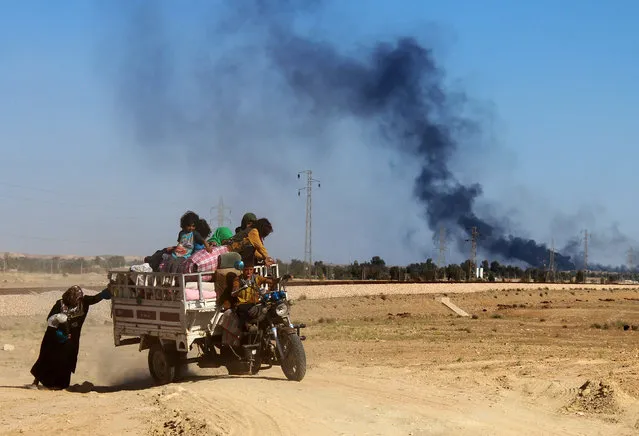
An Iraqi woman pushes a tricycle as government forces evacuate hundreds of Iraqis from the town of Heet in Iraq's Anbar province, to a safe area far from the battlefields where Iraqi troops are trying to retake the western town from the Islamic State (IS) group on April 4, 2016. Earlier in the week Iraqi security forces recaptured parts of Heet, which was one of the largest population centres in Anbar province still held by the Islamic State (IS) group, but other areas remain under jihadist control. (Photo by Moadh Al-Dulaimi/AFP Photo)
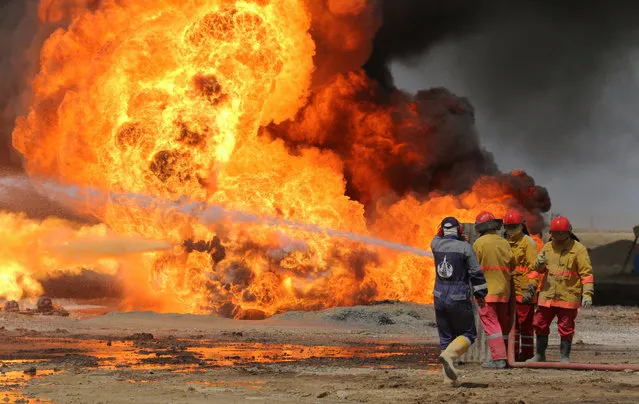
Iraqi firefighters try to stop the fire of burning oil wells in Kirkuk, northern Iraq, 02 June 2016. Two Khabbaz oil field wells in Kirkuk Province, northern Iraq, exploded by suspected insurgents, a security official said. (Photo by EPA/Stringer)
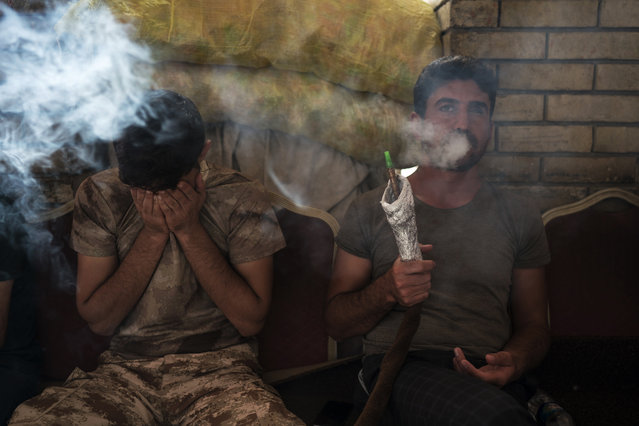
Kurdish men smoke a water pipe in central Irbil, Iraq, Wednesday, October 25, 2017. In Sept. 2017, Iraq's Kurds celebrated their symbolic vote for independence, but instead of moving forward with negotiations toward a smooth divorce from Baghdad, they have lost their most important oil-producing city to Iraqi troops, squeezing a hurting economy and dashing the hopes of an independent state. (Photo by Felipe Dana/AP Photo)
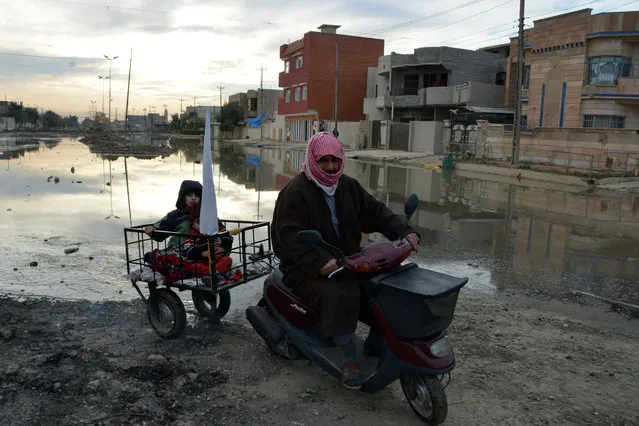
An Iraqi man drives a motorcycle, carrying a children and a white flag, in al-Muharibin neighbourhood of Mosul, as people gather for aid distribution on December 8, 2016 during an ongoing government forces operation against Islamic State (IS) group jihadists. (Photo by Mahmoud Al-Samarrai/AFP Photo)
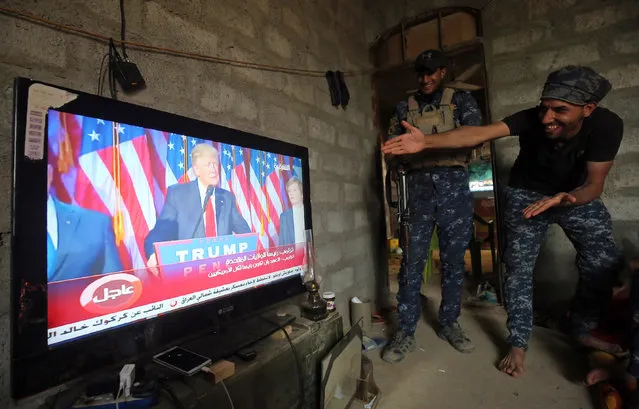
Members of the Iraqi forces react as they watch Donald Trump giving a speech after he won the US president elections in the village of Arbid on the southern outskirts of Mosul on November 9, 2016, as they rest in a house during the ongoing military operation to retake Mosul from the Islamic State (IS) group. Iraqi Prime Minister Haider al-Abadi congratulated Donald Trump on his election as president and said he hoped for continued US and international support in the war against jihadists. (Photo by Ahmad Al-Rubaye/AFP Photo)
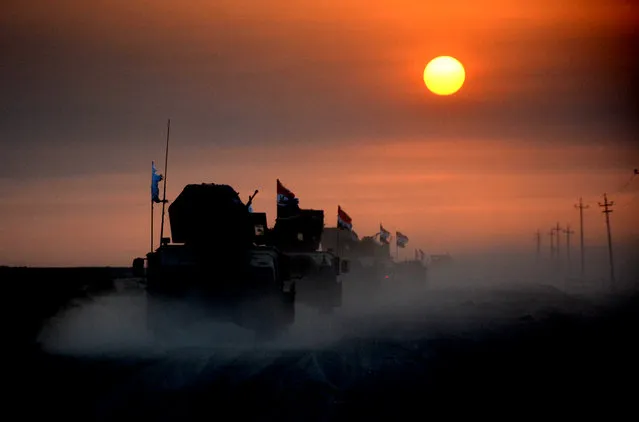
Pro-government forces drive in military vehicles in Iraq's eastern Salaheddin province, south of Hawijah, on October 10, 2016, as they clear the area in preparation for the push to retake the northern Iraqi city of Mosul, the last Islamic State (IS) group held city in Iraq. (Photo by Mahmoud al-Samarrai/AFP Photo)
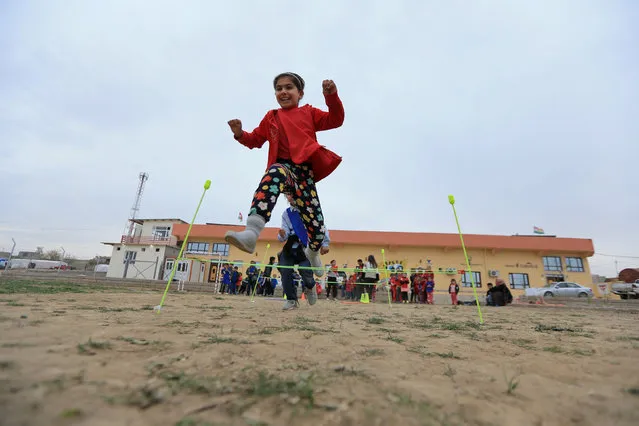
A Yazidi child who survived the 2014 massacre of the religious minority in Sinjar plays outside the Harman orphanage centre in Duhok, Iraq December 19, 2017. (Photo by Ari Jalal/Reuters)
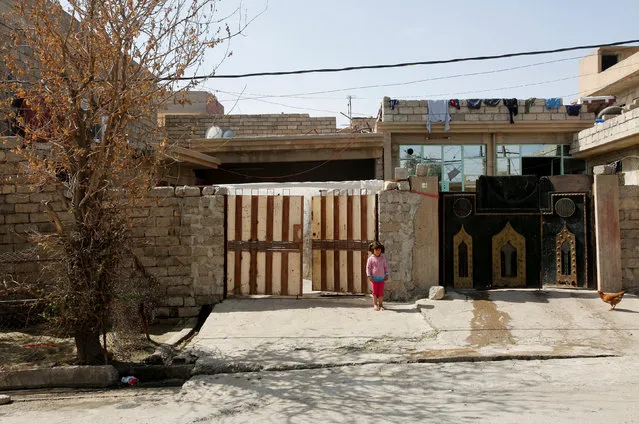
A daughter of Mohammed Saleh Ahmad and Iman Abdullah Saleh stands in front of her house in Mosul, Iraq, March 21, 2018. Mohammed Saleh Ahmad, his wife, parents and five children fled their home in March 2017 when US-led coalition forces began their advance on western Mosul, the final stretch to rout Islamic State militants who had overrun the city in 2014. The family lived in Hamam al-Alil refugee camp and returned home to Mosul in February 2018. (Photo by Khalid Al-Mousily/Reuters)
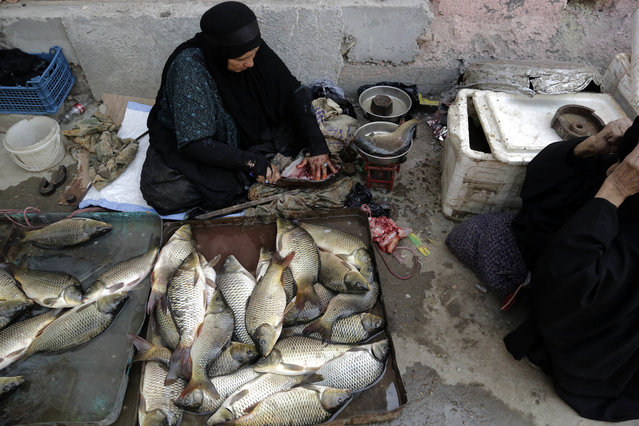
In this September 11, 2017 photo, women gut and sell fish at a market in central Chabaish, Iraq. In the largely agrarian society in Iraq’s vast wetlands, women make up a sizeable proportion of the workforce, fishing, raising buffalo and selling in local markets. (Photo by Susannah George/AP Photo)
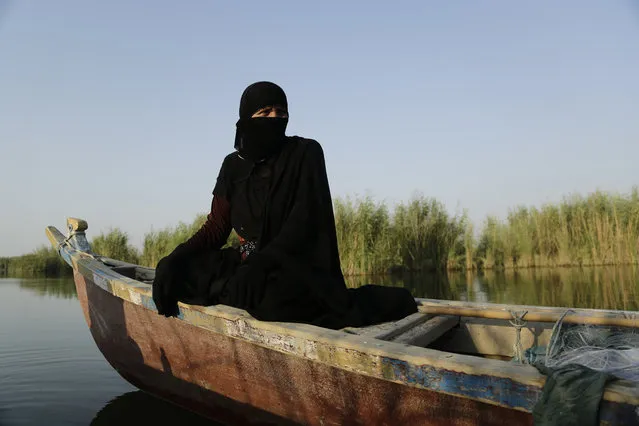
In this September 11, 2017 photo, a fisherwoman prepares to lay out her netting beside a bank of reeds in the marsh of Chabaish, Iraq. The majority of the marsh’s roughly 6,000 inhabitants subsist on fishing and raising water buffalo, but as water quality continues to drop, yields have diminished and increasingly residents are living in poverty. (Photo by Susannah George/AP Photo)
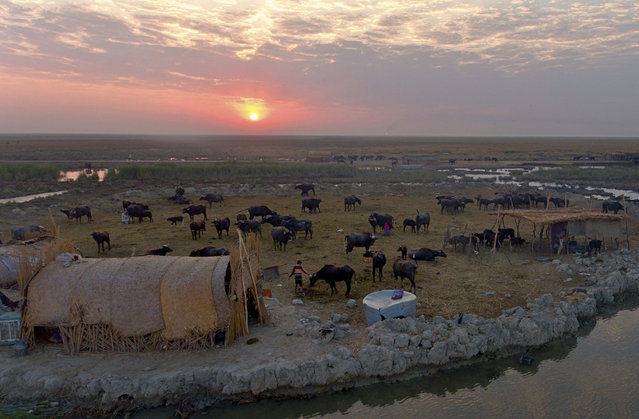
In this Monday, September 11, 2017 photo, the Sun sets over an island paddock for water buffalo in the Chabaish marsh in Nasiriyah, about 200 miles (320 kilometers) southeast of Baghdad, Iraq. Iraq’s southern marshes, a lush remnant of the cradle of civilization, were reborn after the 2003 fall of Saddam Hussein when residents dismantled dams he had built a decade earlier to drain the area in order to root out Shiite rebels. But now the largest wetlands in the Middle East are imperiled again, by government mismanagement and new upstream projects. (Photo by Nabil al-Jurani/AP Photo)
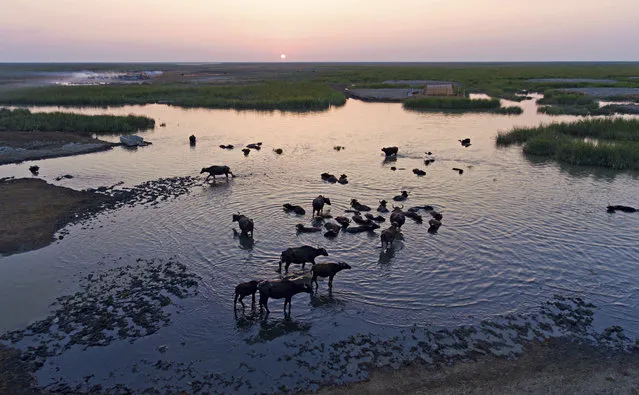
In this Monday, September 11, 2017 photo, water buffalo wade in the Chabaish marsh in Nasiriyah, about 200 miles (320 kilometers) southeast of Baghdad, Iraq. Iraq’s southern marshes, a lush remnant of the cradle of civilization, were reborn after the 2003 fall of Saddam Hussein when residents dismantled dams he had built a decade earlier to drain the area in order to root out Shiite rebels. (Photo by Nabil al-Jurani/AP Photo)
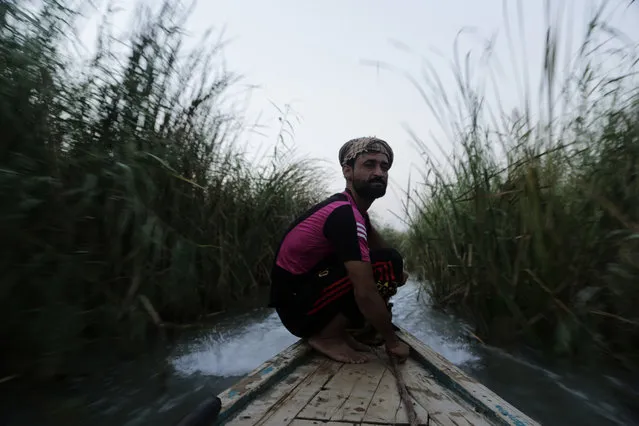
In this photo, a young man drives a boat through a tunnel of towering reeds, in the marsh of Chabaish, Iraq, September 11, 2017. Increasingly unable to support their families with fishing and farming, hundreds of young men from the area took up arms in the fight against the Islamic State group, joining state-sanctioned Shiite militias. (Photo by Susannah George/AP Photo)
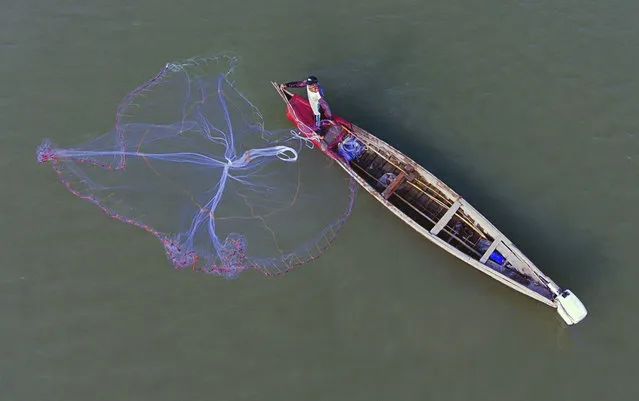
In this Monday, September 11, 2017 photo, a fisherman casts his net into the Chabaish marsh in Nasiriyah, about 200 miles (320 kilometers) southeast of Baghdad, Iraq. Iraq’s southern marshes, a lush remnant of the cradle of civilization, were reborn after the 2003 fall of Saddam Hussein when residents dismantled dams he had built a decade earlier to drain the area in order to root out Shiite rebels. (Photo by Nabil al-Jurani/AP Photo)
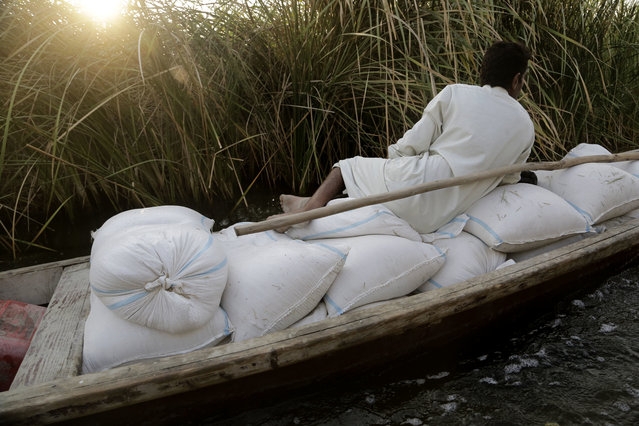
In this September 10, 2017 photo, Farmers transport feed for livestock along a canal in Iraq’s southern marshes in Chabaish, Iraq. The majority of the wetland’s inhabitants raise water buffalo and fish to support their families but due to decreased water quality and low fish yields, the region is mired in poverty. (Photo by Susannah George/AP Photo)
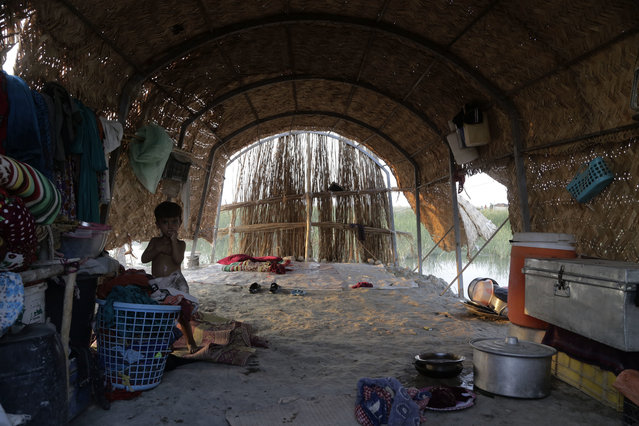
In this September 10, 2017 photo, a child stands inside a traditional reed hut deep inside Iraq’s marshes in Chabaish, Iraq. While the region was declared a UNESCO heritage site in 2016 the central government in Baghdad has continued to neglect the wetlands, failing to provide basic services like electricity and schools. (Photo by Susannah George/AP Photo)
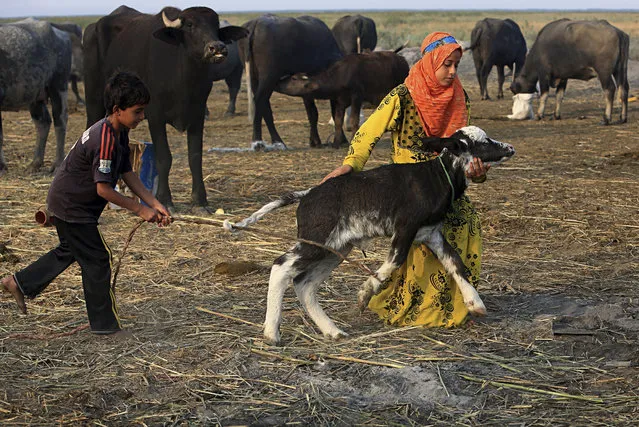
In this Monday, September 11, 2017 photo, a water buffalo is taken to an island paddock in the Chabaish marsh in Nasiriyah, about 200 miles (320 kilometers) southeast of Baghdad, Iraq. Iraq’s southern marshes, a lush remnant of the cradle of civilization, were reborn after the 2003 fall of Saddam Hussein when residents dismantled dams he had built a decade earlier to drain the area in order to root out Shiite rebels. But now the largest wetlands in the Middle East are imperiled again, by government mismanagement and new upstream projects. (Photo by Nabil al-Jurani/AP Photo)
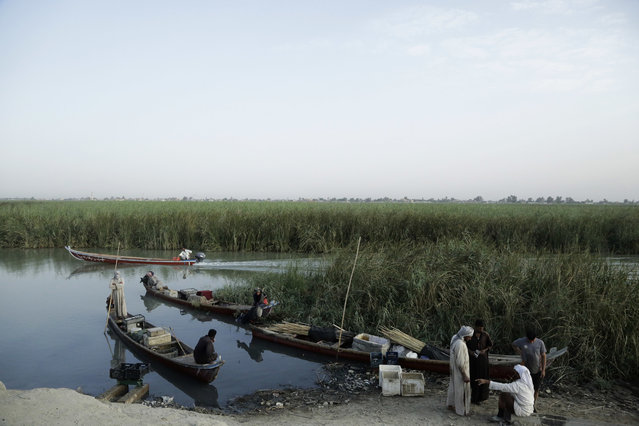
In this September 10, 2017 photo, fisherman gather in the morning at an ad hoc market along a main canal in the marsh of Chabaish, Iraq. From here merchants buy fish to transport and sell to markets in the nearby cities of Nassariyah and Najaf in Iraq’s south. (Photo by Susannah George/AP Photo)
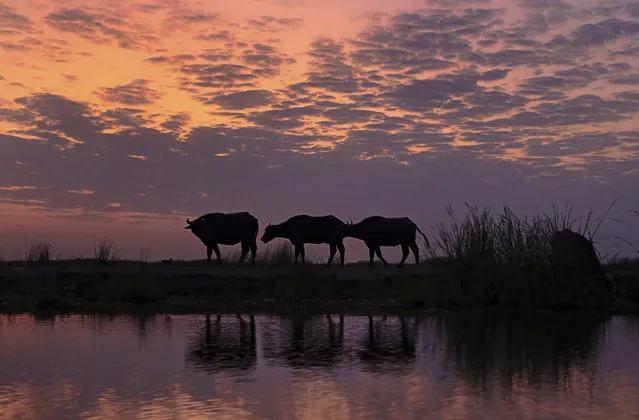
In this Monday, September 11, 2017 photo, water buffalo walks on the bank during sunset in the Chabaish marsh in Nasiriyah, about 200 miles (320 kilometers) southeast of Baghdad, Iraq. Iraq’s southern marshes, a lush remnant of the cradle of civilization, were reborn after the 2003 fall of Saddam Hussein when residents dismantled dams he had built a decade earlier to drain the area in order to root out Shiite rebels. But now the largest wetlands in the Middle East are imperiled again, by government mismanagement and new upstream projects. (Photo by Nabil al-Jurani/AP Photo)
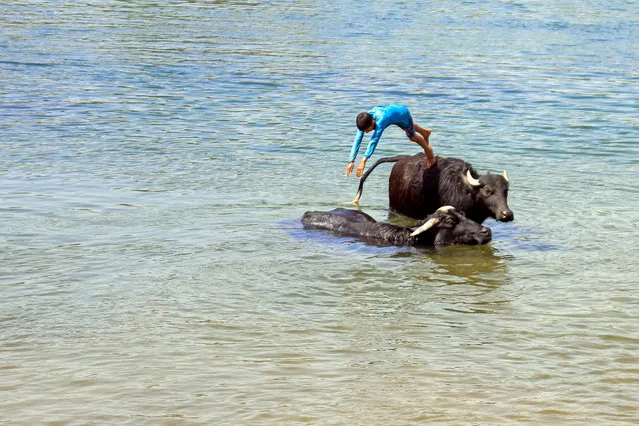
Buffalo breeders oversee their livestock in the Umm Khashm area, some 25 km away from Najaf, on March 20, 2018. (Photo by Haidar Hamdani/AFP Photo)
24 May 2018 00:01:00,
post received
0 comments
